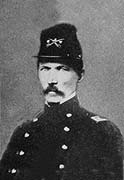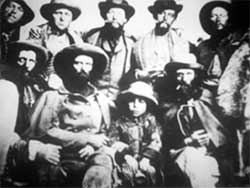
Recovery of Reuben Van Ornum
Headquarters Second Cavalry, California Volunteers,
Camp Douglas, Utah, November 28th, 1862
Lieutenant: I have the honor to report that, agreeable to instructions of the Colonel commanding the district, I left this camp on the night of the twentieth instant and proceeded to Cache Valley, where I arrived about eleven o'clock p.m. on the twenty-second, distance one hundred miles, where I was met by Mr. Van Orman, the uncle of the emigrant boy you ordered me to rescue from the Indians. He informed me that Chief Bear Hunter was encamped, with thirty or forty of his tribe, Shoshones, Snakes and Bannocks, about two miles distant. I left the horses in the settlement called Providence, in charge of a guard, and started about one o'clock for the Indian camp. The night was dark and cold, and we did not find the camp until the morning of the twenty-third. I then divided my command into three parties, under Captain Smith, Lieutenant Conrad, and myself, with instructions to surround the camp and close in upon them at daybreak.
I found in a tent two squaws. The Indians had all left that night, as I perceived that the fires in their huts were not extinguished. I then returned to where I had left the horses, at which place I arrived about seven o'clock a.m. Captain Smith brought in one Indian, caught in trying to escape; I made a prisoner of him. About eight o'clock a party of mounted Indians, I should think thirty or forty, armed with rifles, bows and arrows, made their appearance from a canyon on a bench between the settlement and the hills, about a mile from the settlement, and made a war-like display, such as shouting, riding in a circle, and all sorts of antics known only to their race. I immediately ordered my men to mount, divided them as before, sent Captain Smith to the right, Lieutenant Conrad to the left, and I took the center, driving the Indians into the canyon.
When I arrived at the mouth of the canyon I halted for the purpose of reconnoitering; just at that time the Indians opened fire upon Lieutenant Conrad. I then ordered my men to commence firing, and to kill every Indian they could see. By this time the Indians had possession of the canyon and hills on both sides. I found it would be impossible to enter the canyon without exposing my men greatly. I therefore reinforced Lieutenant Conrad on the left of the canyon, with orders to take the hill on the left of the canyon at all hazards. About the time the reinforcements reported to him, Chief Bear Hunter made his appearance on a hilltop on the right, with a flag of truce (as I was informed afterwards); I at the time took it to be a war-like demonstration. A citizen who heard his hallooing came up to me and told me that the chief said they did not want to fight any more. I then ordered my men to cease firing, and him to say to the chief if they would surrender and come in I would not kill them, which terms they acceded to. Chief Bear Hunter with twenty or more of his warriors then came in. I took them into the settlement, took Bear Hunter and four others that I thought to be prominent Indians and examined them (through an interpreter) as to the whereabouts of the white boy, and ascertained that he had been sent away some days before.

I told Bear Hunter to send some of his tribe and bring the boy to me; that I should hold the five as hostages until they delivered him to me. He dispatched three of his men, and they returned the next day about noon with the boy. I then released Bear Hunter and the four others. I killed three and wounded one Indian in the fight. I was told by Bear Hunter that an Indian known as Weber Tom, alias Utah Tom, communicated the information of our approach. In relation to the emigrant stock I was ordered to examine into and bring to camp, I could not find any such, and from the information I could gather, I am of the opinion that all, or nearly all, of the stock taken by the Indians last summer is now in the Humboldt country. I left Cache Valley on the morning of the twenty-fifth, and arrived at this camp on the afternoon of the twenty-seventh, without the loss or scratch of man or horse. It affords me great pleasure to report to the Colonel commanding the good conduct of the command, and during the fight, which lasted about two hours, the officers and men behaved handsomely.1
Very respectfully, your obedient servant,
Major, Second Cavalry, California Volunteers.
Colonel P. Edward Connor, Third Infantry, California Volunteers, Commanding District of Utah, Camp Douglas, Utah.
Notes…
- MXXXXX, published by the Smithfield Sentinel, Friday, May 12, 1922.